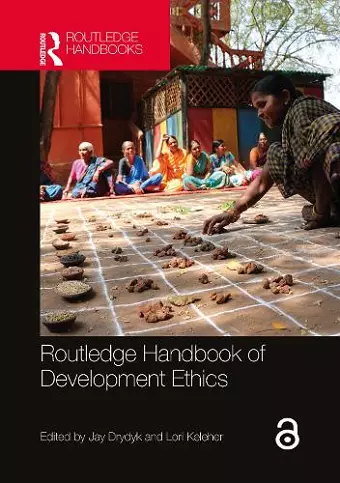Routledge Handbook of Development Ethics
Jay Drydyk editor Lori Keleher editor
Format:Hardback
Publisher:Taylor & Francis Ltd
Published:13th Jul '18
Should be back in stock very soon
This hardback is available in another edition too:
- Paperback£45.99(9780367629458)

The Routledge Handbook of Development Ethics provides readers with insight into the central questions of development ethics, the main approaches to answering them, and areas for future research. Over the past seventy years, it has been argued and increasingly accepted that worthwhile development cannot be reduced to economic growth. Rather, a number of other goals must be realised:
- Enhancement of people's well-being
- Equitable sharing in benefits of development
- Empowerment to participate freely in development
- Environmental sustainability
- Promotion of human rights
- Promotion of cultural freedom, consistent with human rights
- Responsible conduct, including integrity over corruption
Agreement that these are essential goals has also been accompanied by disagreements about how to conceptualize or apply them in different cases or contexts. Using these seven goals as an organizing principle, this handbook presents different approaches to achieving each one, drawing on academic literature, policy documents and practitioner experience.
This international and multi-disciplinary handbook will be of great interest to development policy makers and program workers, students and scholars in development studies, public policy, international studies, applied ethics and other related disciplines.
"Jay Drydyk and Lori Keleher have done a stellar job in bringing leading scholars in development ethics together for this Handbook of Development Ethics. The chapters in this handbook make it clear that development is not just about economic growth, but in the first place about wellbeing, justice, empowerment, the environment, human rights, cultural freedoms, and taking responsibilities. This handbook will become an essential resource for any student or teacher of development ethics. And it should be interesting for anyone who wants to think systematically about what matters when moving towards a better world for all." — Ingrid Robeyns, Chair in Ethics of Institutions, Department of Philosophy and Religious Studies, Utrecht University, Netherlands
"The three quarters of a century after the second world war has seen dramatic improvements, on average, in life expectancy, educational achievements, and income in parts of the world where these were lowest. The "on average" qualification is of course important—some have benefited much more than others, and significant numbers have been immiserized. What are the basic ethical principles according to which one would assess the gains for some against the losses for others in health, education and income? Are these the only dimensions along which changes are to be measured and assessed? And in any case, can such consequentialist perspectives capture the essence of ethical dilemmas in development? These questions do not make for easy answers, and there is lively debate among scholars on development ethics, animated by ground level political expressions, sometimes violent, of huge discontent among those "being developed". This excellent volume brings together leading analysts to chart the terrain and lay the foundations for further systematic debate and exploration. It will become a go to reference for those working on normative assessment of the development process." — Ravi Kanbur, T.H. Lee Professor of World Affairs, International Professor of Applied Economics and Management, and Professor of Economics at Cornell University, USA
"This book is an extraordinary conversation among diverse ethical values that in the process revises each one of them. Like in a symphony, where the color and sound of an instrument is perceived differently when joined by others, the seven values organizing this handbook interact as living creatures. The orchestra is in place; and it is worth listening to it like a unified piece. It is much more than a handbook." — Javier M. Iguiniz-Echeverria, Professor Emeritus, Pontifical Catholic University of Peru, Executive Secretary of the National Accord of Peru, President of the Institute for Human Development in Latin America
ISBN: 9781138647909
Dimensions: unknown
Weight: 952g
440 pages